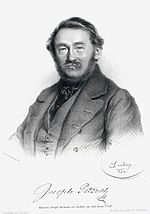Joseph Petzval

Jozef Maximilián Petzval (also Josef Maximilian Petzval and Petzvál József Miksa) (6 January 1807 — 17 September 1891)
Petzval was born in Spišská Belá (German: Zipser Bela, Hungarian: Szepesbéla), Kingdom of Hungary (now in Slovakia), he died in Vienna, Austria. He was an ethnic Slovak, but due to his strong ties to Budapest, he is often counted as Hungarian.
Petzval studied and later lectured at the University of Pest (part of the later Budapest). In 1837 he accepted a chair of mathematics at the University of Vienna.
Petzval is most well known for the construction of the Petzval portrait lens, an optical design still in use 150 years after its invention. He did extensive work on aberration in optical systems, some key topics were later named after him:
- Petzval surface is the curved parabolic image surface of an uncorrected lens system.
- Petzval condition is the design constraint for lens systems which make the image surface a plane.
In mathematics he worked on applications of the Laplace transform.
In 1957, the Joseph Petzval Award was founded for his memory in Hungary, to award achievements in optics, acoustics, film and video technology, precision mechanics, photochemistry, and theatre technology. There exists a Joseph Petzval Medal as well.
Sources
- On the Joseph Petzval Award (in Hungarian)
- On the Joseph Petzval Medal (in Hungarian)
